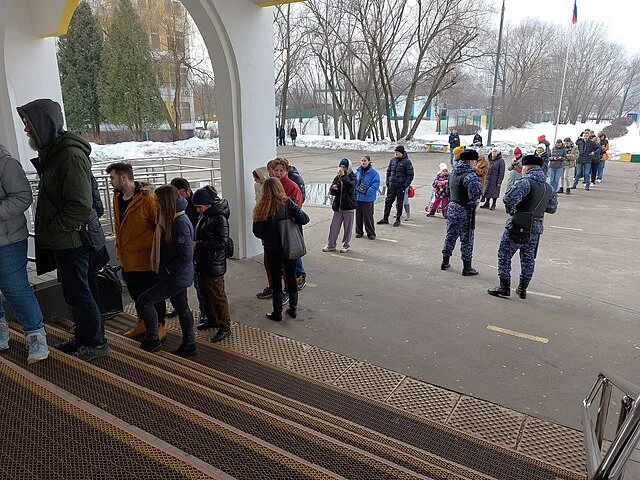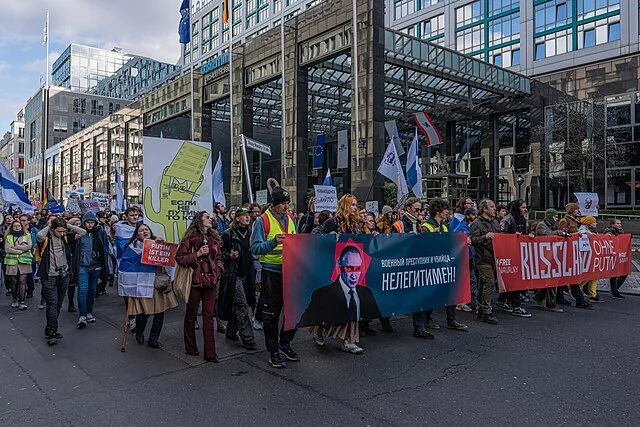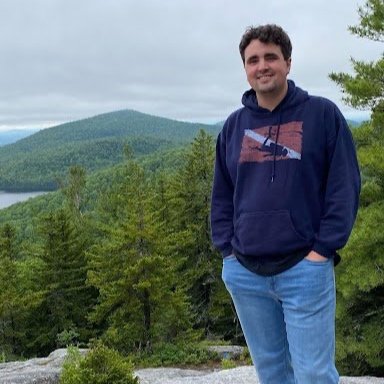In Russia, protests in opposition to Putin’s rule continue despite the death of Alexei Navalny.
The late Alexei Navalny. Mitya Aleshkovskiy. CC BY-SA 4.0
On February 16, 2024, Alexei Navalny, outspoken critic of Vladimir Putin and major activist in Russian domestic politics, died in a Russian prison. On March 17, 2024, believers in Navalny’s vision took the next step in opposition to the president.
Despite his death, Navalny’s anti-Putin rhetoric continues to echo through the streets of Moscow. On the final day of the 2024 Russian presidential election, groups of silent protestors gathered at polling places across the country at exactly twelve o'clock noon in a demonstration dubbed “Noon Against Putin.” The plan had been endorsed by Navalny prior to his death, and the call was taken up afterwards by his widow, Yulia Navalnaya, via a video on YouTube in the days before the election.
The demonstrators voiced their disapproval of the unfair elections by either writing in Navalny’s name on their ballots, invalidating their vote, or simply leaving without voting at all. Around the world, Russian citizens also formed silent queues at embassies in Berlin and London, standing in solidarity with the demonstrators in Siberia and Moscow. Many also took to social media to decry what they called an unfair and rigged election, denying the Kremlin’s repeated claims that their president is always democratically chosen.
Protestors outside of a polling place in Moscow. Konopeg, CC0
Navalny was one of the few Russian citizens willing to outright oppose Vladimir Putin’s rule. He was arrested several times for leading protests against corruption in the Kremlin and eventually joined a centrist political party to work towards fair and just elections, among other humanitarian improvements in the daily lives of the Russian people. Navalny’s death in a Russian prison in the Arctic sparked outcry worldwide, with many world leaders accusing Putin of direct involvement.
A procession outside the Russian Embassy in Berlin. A.Savin, Free Art License
“Noon Against Putin” was carried out with the knowledge that some arrests were inevitable. The demonstration ended with at least 60 citizens imprisoned and 15 criminal charges filed. Not only did the people gathering at the ballot boxes understand that their demonstration would not change the election, but they also came in spite of the laundry list of potential punishments from the authorities. The threats of imprisonment, and possibly death in captivity, hang over the heads of any Russian citizen who speaks out against the Kremlin. But the community that Navalny has built seems unafraid of these consequences. Even though Putin was still reelected, this brief and solemn display of unity among the Russian people shows that even without their vocal leader, the anti-Putin masses are still here, and are still willing to show their disapproval.
The Kremlin, and thus Vladimir Putin, still holds complete control over Russia and its government, but the forward momentum that these protestors represent, no matter how small it may appear now, suggests a potential shift in the balance of power. In the past, Russian citizens have had little choice but to put their heads down and keep moving forward. Today, Navalny’s memory has spurred those same citizens to take action towards a vision of change.
Ryan Livingston
Ryan is a senior at The College of New Jersey, majoring in English and minoring in marketing. Since a young age, Ryan has been passionate about human rights and environmental action and uses his writing to educate wherever he can. He hopes to pursue a career in professional writing and spread his message even further.




